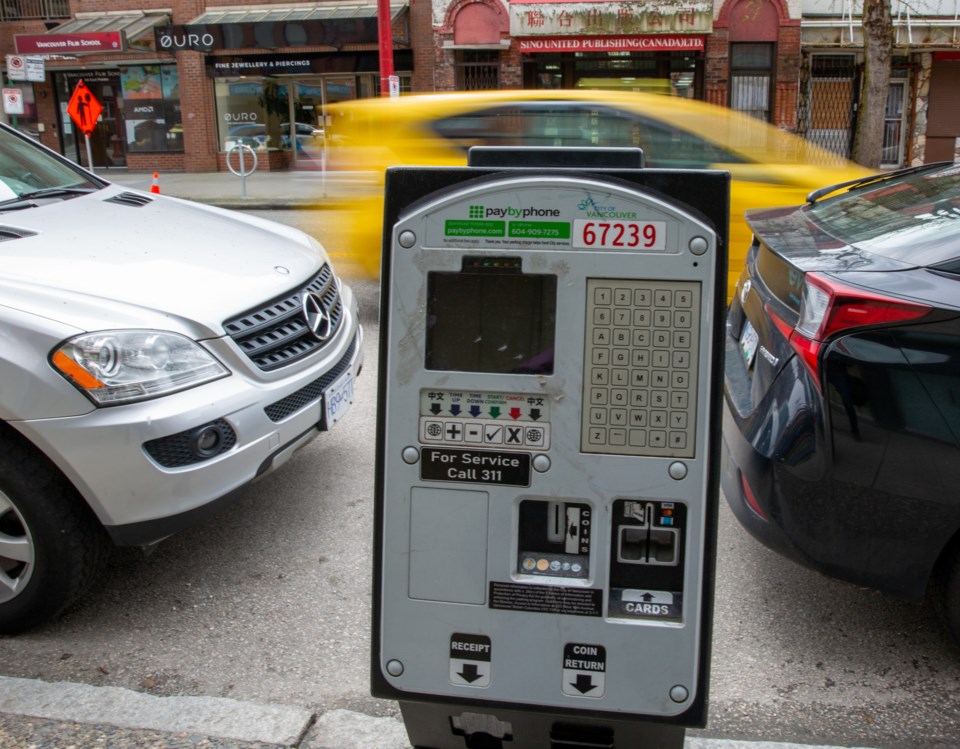Update: Council unanimously approved the staff recommendation April 26. The $2 flat rate takes effect June 1.
A staff report that goes before Vancouver city council April 26 recommends setting parking meter fees at $2 per hour in Chinatown as part of a pilot project that would run until the end of 2024.
The $2 rate, which is being recommended to help the city’s efforts to revitalize Chinatown, would be applicable between 9 a.m. and 10 p.m. and mean some sections of the historic community would be cheaper to park.
“Great idea,” said Jordan Eng, president of the Vancouver Chinatown Business Improvement Association Society. “We've been fighting for more parking rates for about four or five years — even before the pandemic — and that lobbying has kind of been to deaf ears.”
Parking meter fees in Chinatown currently range from $1 to $5 per hour from 9 a.m. to 6 p.m., and from $1 to $3 per hour from 6 p.m. to 10 p.m. The city report defines Chinatown’s boundaries roughly as Gore Avenue, Union Street, Keefer Street and East Pender Street.
Staff made the $2-per-hour recommendation based on a survey of businesses in Chinatown.
“There was a perception that parking meter fees were $5 per hour throughout Chinatown, but parking meter fees on more than half of the blocks are actually $2 per hour or less,” the staff report said.
“Although some businesses wanted free parking during certain times of day, others recognized that free parking would result in a lack of turnover and less parking availability for customers.”
At $2 per hour across Chinatown, the report said the fee would reduce the cost of parking on the most expensive blocks — 100 and 200-blocks of East Pender Street, for example — and would provide clear and consistent pricing to customers, regardless of where or when they park.
The report said street parking in Chinatown is generally busiest from 11 a.m. to 3 p.m. and from 6 p.m. to 8 p.m. Fridays and Saturdays tend to be busier while Mondays and Tuesdays tend to be quieter.
In settling on the $2-per-hour recommendation, staff analyzed four other options, which will be up for discussion when council meets next Wednesday.
The other options are:
- Lower all on-street parking fees to $1 per hour from 9 a.m. to noon
- Make on-street parking $1 per hour cheaper from 9 a.m. to 6 p.m.
- Where the current rate is $4 per hour, make it $3 per hour
- Make on-street parking free after 4 p.m.
- Make on-street parking free after 6 p.m.
- Make on-street parking free after 8 p.m.
In addition to the survey, staff met with representatives from the Vancouver Chinatown Business Improvement Association, the Vancouver Chinatown Foundation, the Vancouver Chinatown Merchants Association, Dr. Sun Yat-Sen Classical Chinese Garden and the Chinese Cultural Centre.
In total, 250 responses to the survey were received, with 58 per cent of respondents requesting cheaper but not free parking. Businesses wanted less variability in the parking meter fees from block to block and desired a more consistent meter fee throughout the entire area, the report said.
After the cost of parking, 23 per cent of respondents said the top parking challenge was not having enough parking for customers and visitors.
Concerns were also raised over security, safety, and vandalism when parking both on and off-street. In particular, despite ample capacity and availability, there was a perception the Chinatown Plaza Parkade on Keefer Street was “unsafe and prone to break-ins,” the report said.
Each option represents a loss in parking revenue, with Chinatown bringing in $1.8 million from meters in 2022. If council were to adopt staff’s $2-per-hour recommendation, it would mean roughly an annual loss of $355,000, or 20 per cent of total Chinatown parking revenue.
Making on-street parking free after 4 p.m. would mean a $785,000 annual hit on revenue.
“For any option that is selected, there is a risk that other BIAs or neighbourhoods will request the same adjustment to parking meter fees in their areas as each option is a deviation from the occupancy-based parking meter bylaw policy, which is currently applied uniformly across the City of Vancouver,” the report said.
“If one of the options were to be applied city-wide, the potential forgone annual revenue is estimated to range from $7.2 million to $18.6 million.”
In recent years, Eng has spoken to city council and the Vancouver Police Board about concerns Chinatown merchants have raised regarding crime and graffiti and the effect on business in the community.
Chinatown has also suffered from the growth of Asian-centred shopping districts in Richmond and Burnaby. He said providing a consistent parking rate across Chinatown will help attract customers.
“In six blocks, you've got six different rates over two different time periods, which is confusing,” Eng said. “And of course, everyone only sees the $5-an-hour rate, which becomes the reason not to go into the neighbourhood, which is really damaging.”
Across the city, parking meter fees are adjusted annually on a block-by-block basis based on the parking occupancies observed during the year. When the average parking occupancy of a block is greater than 85 per cent, the parking meter fee is raised by $1 per hour.
Conversely, when the occupancy of a block is less than 60 per cent, the meter fee is reduced by $1 per hour to no lower than $1 per hour, according to the city’s parking meter bylaw.




